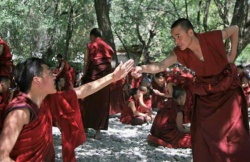Difference between revisions of "Debate"
(Created page with "thumb|250px| '''Debate''' is contention in argument; dispute, controversy; discussion; especially the discussion of questions of public interest in Par...") |
|||
| Line 1: | Line 1: | ||
[[File:Debate50_r.jpg|thumb|250px|]] | [[File:Debate50_r.jpg|thumb|250px|]] | ||
| − | + | [[Debate]] is contention in argument; dispute, controversy; [[discussion]] ; especially the [[discussion]] of questions of public [[interest]] in Parliament or in any assembly. | |
| − | [[Debate]] is a method of interactive and representational argument. [[Debate]] is a broader form of argument than deductive reasoning, which only examines whether a conclusion is a consequence of premises, and factual argument, which only examines what is or isn't the case, or [[rhetoric]], which is a technique of persuasion. Though [[ | + | [[Debate]] is a method of interactive and representational argument. [[Debate]] is a broader [[form]] of argument than deductive reasoning, which only examines whether a conclusion is a consequence of premises, and factual argument, which only examines what is or isn't the case, or [[rhetoric]] , which is a technique of persuasion. Though logical [[consistency]] , factual accuracy and some degree of [[emotional]] appeal to the audience are important elements of the art of persuasion, in [[debating]] , one side often prevails over the other side by presenting a superior "context" and/or framework of the issue, which is far more subtle and strategic. The outcome of a [[debate]] depends upon consensus or some formal way of reaching a resolution, rather than the objective facts as such. In a formal [[debating]] contest, there are rules for participants to discuss and decide on differences, within a framework defining how they will interact. |
| − | [[Debating]] is commonly carried out in many assemblies of various types to discuss matters and to make resolutions about action to be taken, often by a vote. Deliberative bodies such as parliaments, legislative assemblies, and meetings of all sorts engage in [[debates]]. In particular, in parliamentary democracies a legislature [[debates]] and decides on new laws. Formal [[debates]] between candidates for elected office, such as the leaders [[debates]] and the U.S. presidential election [[debates]], are sometimes held in democracies. [[Debating]] is also carried out for educational and recreational purposes, usually associated with educational establishments. The major goal of the study of [[debate]] as a method or art is to develop the ability to debate rationally from either position with equal ease. | + | [[Debating]] is commonly carried out in many assemblies of various types to discuss matters and to make resolutions about action to be taken, often by a vote. Deliberative [[bodies]] such as parliaments, legislative assemblies, and meetings of all sorts engage in [[debates]] . In particular, in parliamentary democracies a legislature [[debates]] and decides on new laws. Formal [[debates]] between candidates for elected office, such as the leaders [[debates]] and the U.S. presidential election [[debates]] , are sometimes held in democracies. [[Debating]] is also carried out for educational and recreational purposes, usually associated with educational establishments. The major goal of the study of [[debate]] as a method or art is to develop the ability to [[debate]] rationally from either position with equal ease. |
| − | Although informal [[debate]] is common the quality and depth of a [[debate]] improves with knowledge and skill of its participants as debaters. The outcome of a contest may be decided by audience vote, by judges, or by some combination of the two. | + | Although informal [[debate]] is common the quality and depth of a [[debate]] improves with [[knowledge]] and skill of its participants as [[debaters]] . The outcome of a contest may be decided by audience vote, by judges, or by some combination of the two. |
{{W}} | {{W}} | ||
[[Category:Buddhist Philosophy]] | [[Category:Buddhist Philosophy]] | ||
Revision as of 10:45, 21 July 2013
Debate is contention in argument; dispute, controversy; discussion ; especially the discussion of questions of public interest in Parliament or in any assembly.
Debate is a method of interactive and representational argument. Debate is a broader form of argument than deductive reasoning, which only examines whether a conclusion is a consequence of premises, and factual argument, which only examines what is or isn't the case, or rhetoric , which is a technique of persuasion. Though logical consistency , factual accuracy and some degree of emotional appeal to the audience are important elements of the art of persuasion, in debating , one side often prevails over the other side by presenting a superior "context" and/or framework of the issue, which is far more subtle and strategic. The outcome of a debate depends upon consensus or some formal way of reaching a resolution, rather than the objective facts as such. In a formal debating contest, there are rules for participants to discuss and decide on differences, within a framework defining how they will interact.
Debating is commonly carried out in many assemblies of various types to discuss matters and to make resolutions about action to be taken, often by a vote. Deliberative bodies such as parliaments, legislative assemblies, and meetings of all sorts engage in debates . In particular, in parliamentary democracies a legislature debates and decides on new laws. Formal debates between candidates for elected office, such as the leaders debates and the U.S. presidential election debates , are sometimes held in democracies. Debating is also carried out for educational and recreational purposes, usually associated with educational establishments. The major goal of the study of debate as a method or art is to develop the ability to debate rationally from either position with equal ease.
Although informal debate is common the quality and depth of a debate improves with knowledge and skill of its participants as debaters . The outcome of a contest may be decided by audience vote, by judges, or by some combination of the two.
